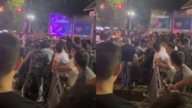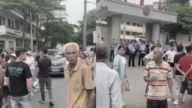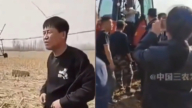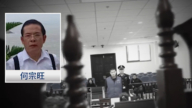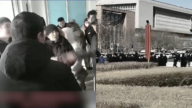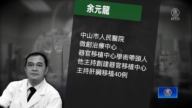【新唐人2014年03月01日訊】去年12月,中共廢除了一直備受國際社會指責的勞教制度,不過在廢除勞教之前,當局早已準備了《社區矯正法》,現在已經送往國務院審議,並在提交審議之前,各地已經實施。日前有律師團指出,《矯正法》違背憲法,比勞教更加邪惡,呼籲當局停止審議。
去年12月28號,中共人大常委會通過了廢止勞教制度的決定。12月29號,大陸媒體發文指出,2003年,中共就開啟了社區矯正試點,不過立法過程非常曲折,一直都在等待一個重要的日子讓《社區矯正法》出臺,而勞教制度退出之日,正是讓《社區矯正法》出臺之時。據了解,現在司法部已經提請國務院審議。
2月27號,大陸超過百名的律師和公民,發表《公民呼籲書》要求國務院,停止審議《社區矯正法》。他們認為當中的第四十四條、和第五十條規定違反憲法、侵犯人權。
《矯正法》第四十四條規定,社區服刑人員行使言論、出版、集會、結社、遊行、示威自由權利等,應當經社區矯正機構批准。而被社區矯正的對像則包括﹕被判處管制、宣告緩刑、假釋、暫予監外執行的罪犯,以及法律規定的其他罪犯。
《公民呼籲書》指出,《矯正法》剝奪了《憲法》賦予公民享有的言論、出版、集會、結社、遊行、示威自由的權利。這類罪犯,大多數並沒有被剝奪政治權利。
《公民呼籲書》還指出,《矯正法》第五十條規定的「進行心理干預」、和「社區矯正場所可以對矯正對像進行30天以下的集中管理」,則是侵犯人權。
大陸維權律師唐吉田:「一定程度上就相當於勞教的復活,黑監獄或者是洗腦班,把它們用非法的東西,表面上形式合法化了。」
在西方社會,社區矯正是一種非監禁的刑罰執行活動,是對罪犯的寬容和人格的尊重,有利於罪犯回歸家庭和社會,體現的是刑罰執行中的人道主義關懷,但還是由司法機關監管。
而《社區矯正法》第7條規定,各級人民政府及其派出機構,居民委員會、村民委員會等群眾自治組織,配合專門的國家機關,開展社區矯正。
另外《矯正法》的第八條規定,縣級人民政府、司法行政部門、和社區矯正機構,負責執行社區矯正,承擔社區矯正日常工作。
南京東南大學法學教授張讚寧:「這個法規是違犯《憲法》的,它擴大了行政權,行政權不應當包括有司法權,如果一旦濫用的話,就有可能把全國變成一個大監獄。」
實際上在廢除勞教之前,大陸媒體報導,司法部已經將《中華人民共和國社區矯正法》納入立法規劃。全國各地也早已開始實施。據司法部統計,目前有66.7萬人正接受社區矯正。
張讚寧:「沒生效之前就已經執行了,這也是違法的。」
南京「東南大學」法學教授張讚寧還指出,《矯正法》中的第六條,規定的司法行政機關、監獄管理機關、審判機關、檢察機關、公安機關等,作為承擔社區矯正任務的專門國家機關,造成職責混亂。
另外《矯治法》第十三條規定,審判機關應聽取檢察機關、辯護律師、司法行政機關、公安機關、監獄管理機關的量刑建議。
張讚寧:「審判機關他是中立的,一邊是控方、一邊是辯方,你又把司法行政機關、公安機關、監獄管理機關加進來,要聽取他們量刑意見,違犯了我們的刑罰和刑事訴訟法了。」
大陸《權利運動》創始人胡軍指出,中共的《矯正法》是把社會變成監獄,可能會像「城管」一樣,僱傭一些臨時工來管理,不但增加了民眾的稅收負擔,出現命案和社會混亂時,中共又會說是臨時工幹的。
採訪編輯/劉惠 後製/蕭宇
Lawyers: Community Correction Law Is Unconstitutional
Prior to the abolition of the Labor Camp system in China
last December, the Marxist regime had already prepared
the abhorrent Community Correction Law.
While the law is still being reviewed by the State Council,
this law had been implemented in a number of places before
it was delivered to the State Council.
Chinese lawyers point out that the Chinese Community Correction
Law violates the Constitution, and is more loathsome and
terrifying than the Labor Camp system.
Lawyers call on the authorities to stop the review.
The Standing Committee of the National People’s Congress
adopted a decision on the abolition of the Labor Education system
on Dec. 28 last year.
On the next day, Chinese media revealed that pilot stations of
Community Correction have been implemented since 2003.
The tortuous legislative process has slowed down the
introduction of the Community Corrections Law.
The day of abolition of the Labor Camp system has thus become
the day to start the Correction Law.
The Ministry of Justice has submitted the law to the State
Council for review.
On Feb. 27, more than 100 lawyers and citizens issued a
“citizen appeal" to the State Council, demanding to stop
reviewing the Community Correction Law.
They believe that Articles 44 and 50 are particularly
unconstitutional and violate human rights.
Article 44 provides:
that while exercising the rights of speech, press, assembly,
association, procession and demonstration, approval shall
be obtained through the Community Correction center.
Those who breach this Article are offenders to be detained,
on probation, parole, and temporary probation.
The “citizen appeal" stated that this Article abolishes rights of
speech, press, assembly, association, procession and
demonstration provided by the Constitution.
Criminals listed in the Article are those who still keep their
political rights.
The “citizen appeal" also noted that Article 50 of the
Correction Law provides “psychological intervention" and
“centralized detention of 30 days or less", as a violation of
human rights.
Human rights lawyer Tang Jitian: “To some extent, the damage
is greater than the labor camp.
The illegality of the labor camp is easy to identify.
However, in the name of Community Correction Law,
all the illegal measures of the Labor Camp will become legalized."
In Western society, Community Correction is a non-custodial
Sentence.
There is a tolerance and respect for the offender.
It provides opportunities for the offenders to return to family
and society, reflecting humanity in the punishment, and is
regulated by the judiciary system.
The Chinese Community Correction Law Article 7 stipulates
that Local Government
and its mass organizations such as the Neighborhood Committees
and Village Committees will collaborate with specialized state
agencies in developing the Community Corrections.
In addition, Article 8 regulates, that the county level government,
judicial and administrative departments, and Community
Correction agencies are responsible for implementing
Community Corrections and its tasks.
Law professor Zhang Zanning, Nanjing Southeast University:
“This legislation is a violation of the Constitution.
It expands the executive power over the jurisdiction.
This abusive regulation will turn the entire state into a big prison."
In fact, before the abolition of labor camp, Chinese media had
reported that the Justice Department has adopted the Community
Correction Law into the legislative plan.
The implementation has already begun across the country.
According to Justice Department statistics, there are currently
667,000 people receiving Community Correction.
Law professor Zhang Zanning: “Implementation before it’s
effective is also violating the law."
Law professor Zhang Zanning points out, the Article 6 in the
Community Correction Law provides,
that the judicial and administrative authorities, prison authorities,
judicial and procuratorial organs, and public security organs,
take over the Community Correction tasks. This is causing
confusion of state organs’ duties.
In addition, Article 13 regulates that the judicial organs should,
pay attention to sentencing recommendations from the
procuratorate, the defense counsel, judicial and administrative
authorities, police authorities, and prison authorities.
Law professor Zhang Zanning: “The judiciary organs should
be neutral towards both sides, the prosecution and the defense.
Including the opinions on sentencing from the judiciary,
administration, police, and prison, violates the process of law."
Human Rights Campaign in China founder Hu Jun indicates,
the CCP’s Correction Law is turning the society into a prison.
It is very likely to develop like the City Urban Administrative
and Law Enforcement Bureau, commonly known as Chengguan.
Temporary workers will be hired to manage the correction centers.
It will not only increase the tax burden of the people,
but also allow the CCP to escape the responsibility when murders
and chaos occur, blaming those temporary workers as the culprits.
Interview & Edit/Liu Hui Post-Production/Xiao Yu


